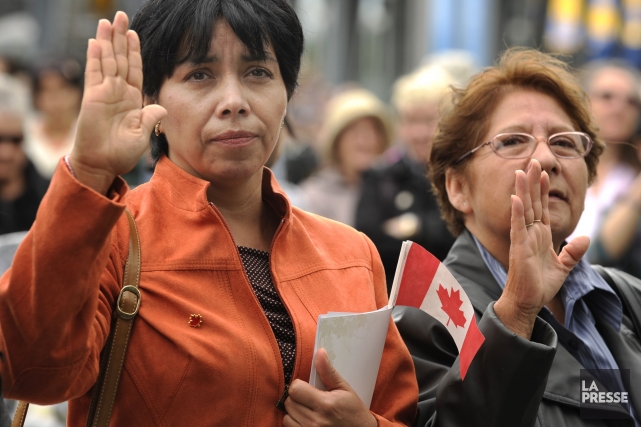A new report suggests immigrants are imposing a "fiscal burden" of about $20 billion a year on Canadian taxpayers and recommends a number of radical changes to the country's immigration selection process, including bringing an end to the sponsorship of parents and grandparents.
The report, released today by the Fraser Institute, also proposes that the current immigrant selection process, which relies heavily on political considerations, be replaced with one that relies primarily on the private sector and labour market conditions.
"I recommend we get rid of the current system altogether, because it relies on decisions made by politicians on issues which are virtually unknowable and we substitute for it the judgment of business people," said Herbert Grubel, a senior fellow at the Fraser Institute and author of the report.
"People who employ workers, who know how much they can pay and have the government only make sure that the system works well and that the pay that is offered to these workers is at least enough to pay for the services they receive."
Canada's foreign-born population soars to 6.8 million
While Grubel argues that immigration of parents and grandparents be stopped completely, he says the changes should be phased in by making it applicable only to new immigrants arriving after the adoption of the proposed policy, allowing immigrants already in Canada to continue with the sponsorship of their parents and grandparents.
But immigration lawyer Zool Suleman said the study fails to look at many other factors, including when parents and grandparents contribute to Canadian society in often intangible ways.
He also referenced a 2011 Simon Fraser University study that found immigrants impose a far lower annual cost of about $450 per immigrant, or about $2 billion per year.
Canada selects the largest proportion of its immigrants using an objective points system that reflects the candidates' education, work experience, language competence, and other indicators that are linked with higher earnings.
Individuals selected on this basis are called "principal immigrants." In 2011, they numbered 64,397, representing 25.8 per cent of the 248,744 immigrants that year.
The principal immigrants were accompanied by their dependants (spouses and underage children) numbering 91,724.
The government refers to the principal immigrants and their dependants as "economic immigrants" who in 2011 numbered 156,121 and represented 62.8 per cent of all immigrants admitted.
"Parents and grandparents do a lot of undocumented, necessary work inside and outside of the house allowing Canadians to actually be out in the labour force," Suleman told CBC News.
"Let alone intangible, important things around values and family structure and trying to enshrine a variety of things that are important to Canada."
Such radical changes to the immigration selection process could result in the loss of highly skilled immigrants to Canada, Suleman warned.
"Over the years what I've seen is, many of the highly skilled immigrants who come and the middle skilled immigrants who come here clearly want the family to be part of the immigration plan, meaning parents and grandparents," he said.
"So I think that if they were not able to bring their parents and grandparents, Canada may not be in the top tier of countries that immigrants select to come to."
In May, Citizenship and Immigration Minister Jason Kenney announced new criteria for sponsoring parents and grandparents to come to Canada that are aimed at ensuring elderly immigrants don't end up on welfare or in social housing.
Don't bring parents here for welfare, Kenney says
"I looked at the detailed steps he has taken and they’re all the right direction," Grubel said of Kenney's reforms. "But I am skeptical that they will in fact succeed in bringing in immigrants that will, in fact, pay for the government services that they consume and will not impose a burden on taxpayers."
The report also advocates for a public inquiry about the number of immigrants that are admitted into Canada on economic and humanitarian grounds.
Grubel said his research also indicated that immigrants who arrived in Canada after 1986 have been less successful economically than those who arrived before that time.
Immigrants a 'fiscal burden,' Fraser Institute report suggests
Those who arrived in Canada after 1986 less successful economically, author says




























Laissez un commentaire Votre adresse courriel ne sera pas publiée.
Veuillez vous connecter afin de laisser un commentaire.
Aucun commentaire trouvé